State of Emergency in Rivers: A Constitutional Breach or Political Necessity? By Christie Doyin

By Christie Doyin JP
The political crisis in Rivers State has taken a dramatic and worrisome turn, raising serious concerns about the future of democracy in Nigeria. Since 2023, the state has been embroiled in a power tussle between former governor Nyesom Wike and his successor, Governor Siminalayi Fubara.
Wike, who played a key role in Fubara’s emergence as governor, sought to maintain control over the state’s resources and administration. However, Fubara’s decision to govern independently sparked a bitter feud that has now escalated into a full-blown constitutional crisis.
The situation reached a breaking point on March 18, 2025, when President Bola Ahmed Tinubu declared a state of emergency in Rivers State, citing political instability, destruction of public infrastructure, and threats to national security. This declaration, however, came with a controversial directive—the suspension of Governor Fubara, his deputy, and all elected members of the State House of Assembly for six months. The President then appointed Vice Admiral Ibokette Ibas (Rtd) as Administrator to oversee the state’s affairs.
This unprecedented move has sparked widespread outrage, with many political analysts, civil society groups, and legal experts, including the Nigerian Bar Association (NBA), condemning the action as unconstitutional. The NBA has argued that while the President has the power to declare a state of emergency under Section 305 of the 1999 Constitution (as amended), he lacks the authority to remove elected officials in the process. Such a decision, they insist, violates Nigeria’s federal structure and democratic principles.
The crisis in Rivers State has been brewing for months. Following his inauguration, Governor Fubara attempted to assert his authority by resisting Wike’s influence. This led to a standoff with the State House of Assembly, most of whose members were allegedly loyal to Wike. The conflict reached its peak when Fubara’s government demolished the House of Assembly complex in December 2023, claiming security concerns. However, the structure was never rebuilt, fueling allegations that the governor intended to rule without legislative oversight.
The Supreme Court, in its ruling on February 28, 2025, condemned Fubara’s actions, stating that a government could not exist without all three arms functioning effectively. The court upheld the status of the 27 lawmakers who had defected, affirming that they remained legitimate members of the House. Furthermore, the ruling called for the immediate passage of an Appropriation Bill, which Fubara’s administration failed to facilitate.
The security situation in the state has further complicated matters. Reports of pipeline vandalisation and militant activities in recent days have raised concerns about governance lapses. The Federal Government cited these security threats as part of the justification for the emergency declaration. However, critics argue that such incidents do not warrant the removal of a democratically elected government, as there are legal means to address governance failures and security breaches.
One of the most shocking developments came just hours before the President’s announcement. Wike reportedly proposed that Fubara’s impeachment would be abandoned if the governor agreed to surrender control of local governments and pledged not to seek re-election in 2027. This demand, seen as a blatant attempt to subvert democracy, further exposed the deep-rooted political maneuvering behind the crisis.
The NBA and other stakeholders have called on the National Assembly to reject the unconstitutional removal of Fubara and his administration. Section 188 of the Constitution outlines clear procedures for impeaching a governor, none of which were followed in this case. Furthermore, the approval of a state of emergency does not automatically dissolve or suspend elected governments. The NBA has warned that allowing such a precedent could embolden future presidents to unseat governors for political reasons, thereby eroding Nigeria’s democratic institutions.
This crisis is not just about Rivers State; it is a test of Nigeria’s commitment to constitutional governance. Political disagreements and power struggles should be resolved through lawful means, not through executive overreach. The people of Rivers State deserve stability, good governance, and respect for their democratic choices. If the unconstitutional suspension of an elected government is allowed to stand, it could set a dangerous precedent for the country’s democratic future.
As the nation watches closely, the question remains: Will the rule of law prevail, or will Nigeria’s democracy continue to suffer at the hands of political power struggles?
Christie, a veteran journalist, writes via cdoyinronk@gmail.com
============